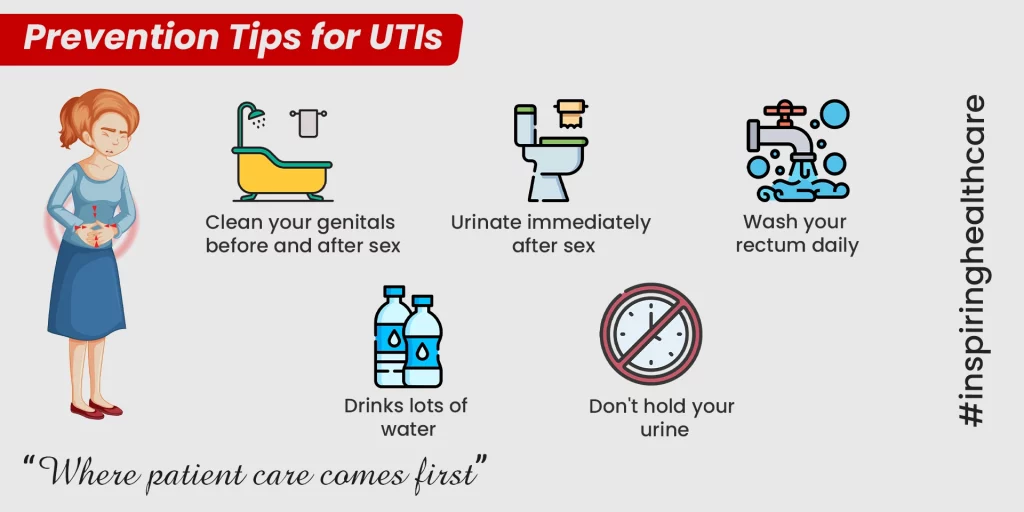Medically Reviewed by: Dr. Sonali Sharma MD- GYNAE & OBS
Urinary Tract Infections (UTIs) are a prevalent and often painful condition affecting millions of individuals worldwide each year. While they may seem like a routine inconvenience, UTIs can lead to serious health complications if left untreated, making prevention a crucial aspect of maintaining overall well-being. Amidst the myriad of factors influencing UTI occurrence, one stands out prominently: proper hygiene.
In this blog, we delve into the intricate relationship between hygiene practices and the prevention of UTIs. We’ll explore the fundamentals of UTIs, the significant role hygiene plays in reducing their risk, and practical strategies individuals can implement in their daily routines to safeguard against these infections. From personal care habits to clothing choices and sexual hygiene practices, we’ll uncover the essential steps needed to maintain urinary tract health.
Whether you’re a woman, man, child, or elderly individual, understanding the nexus between hygiene and UTI prevention is paramount for safeguarding your health. Moreover, we’ll address common myths surrounding UTIs, providing clarity and empowering readers with accurate information to make informed decisions about their hygiene practices.
Also Read: The Dos and Don’ts of Intimate Hygiene: A Guide for Gen Z Women
Understanding Urinary Tract Infections (UTIs)
Causes and Risk Factors
Urinary tract infections (UTIs) stem from microbial invasion, primarily Escherichia coli (E. coli), into the urinary tract. Key risk factors include:
- Female anatomy: Women’s shorter urethra facilitates easier bacterial access to the bladder.
- Sexual activity: UTI incidence often rises with unprotected sexual activity, particularly with new partners.
- Menopause: Hormonal changes post-menopause can alter the urinary tract, increasing susceptibility to UTIs.
- Catheter use elevates UTI risk.
- Diabetes: High glucose levels in urine and compromised immunity in diabetes raise UTI susceptibility.
- Age: Older adults increased UTI vulnerability.
- Poor hygiene: Inadequate hygiene practices, like incorrect wiping after toilet use, amplify UTI risk.
Common Symptoms
UTI symptoms vary based on the affected urinary tract region and may include:
- Pain or burning sensation during urination
- Increased frequency of urination
- Urgency to urinate despite bladder emptiness
- Presence of blood in urine
- Groin or lower abdomen pressure or cramping
- Fever and chills in severe cases
Impact on Health and Well-being
While prompt treatment mitigates complications, untreated UTIs can lead to:
- Recurrent infections
- Kidney damage or infection-related sepsis if untreated.
- Higher risk of low birth weight or premature birth during pregnancy.
The Link Between Hygiene and UTI Prevention
Importance of Personal Hygiene in UTI Prevention Effective hygiene practices act as a barrier against bacteria infiltrating the urinary tract, thereby thwarting UTIs. Key practices include:
- Wiping from front to back post-toilet is used to prevent bacterial transfer from the anus to the urethra.
- Keeping the genital area clean and dry, minimizing bacterial growth.
- Ensuring regular and complete urination to flush out bacteria.
- Maintaining hydration by consuming ample fluids.
Also Read: The Importance of Regular Gynecological Check-ups
B. Consequences of Poor Hygiene Practices on UTIs Neglecting proper hygiene heightens the susceptibility to UTIs. For instance:
- Failing to wipe correctly can introduce anal bacteria to the urethra.
- Inadequate genital hygiene fosters a moist environment ideal for bacterial proliferation.
- Delaying urination and wearing certain types of underwear can elevate UTI risk.
- Unhygienic practices before and after sexual activity exacerbate the likelihood of infection.
C. Additional Hygienic Measures for UTI Prevention Beyond basic hygiene, supplementary practices can bolster UTI prevention:
- Regular consumption of cranberry juice is known to deter bacteria from adhering to bladder cells.
- Integration of probiotics into one’s diet to uphold a healthy bacterial balance in the body.
- Utilization of vaginal estrogen gel is beneficial in mitigating UTIs among postmenopausal women.
Proper Hygiene Practices to Prevent UTIs

Hygiene Habits for Personal Care
- Adequate Hydration: Stay hydrated by drinking plenty of fluids, particularly water, to flush out bacteria.
- Proper Genital Hygiene: Keep the genital area clean and dry. Use mild soap and water to wash the area.
- Wiping Techniques: After using the toilet, always wipe the genital area from front to back to avoid introducing bacteria into the urethra.
Clothing and Hygiene
- Choice of Underwear: Opt for breathable, cotton underwear to maintain dryness in the genital area and minimize bacterial growth.
- Showering Habits: Shower regularly and ensure thorough cleaning of the genital area before and after sexual activity.
- Cleanliness of Bathroom Facilities: Maintain cleanliness and dryness in bathrooms to prevent bacterial proliferation.
Sexual Hygiene and UTI Prevention
- Urinating After Sex: After intercourse, urinate promptly to help eliminate bacteria from the urethra.
- Cleaning Genital Area Before and After Intercourse: Use mild soap and water to cleanse the genital area both before and after sexual activity.
- Safe Sex Practices: Employ condoms and practice safe sex to lower the risk of sexually transmitted infections, which can predispose individuals to UTIs.
These hygiene practices play a crucial role in UTI prevention and decreasing the likelihood of recurrent infections. Consistently maintaining good hygiene habits is essential for safeguarding against UTIs and other potential infections.
Sanjivini Super Speciality, Lucknow, offers personalized consultations to address your health concerns and provide tailored guidance. Reach out to us to schedule your appointment and receive expert advice and support for your healthcare needs.

